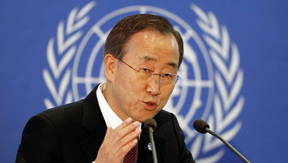 UNITED NATIONS: UN Chief Ban Ki-moon honored over a million Indian soldiers who fought in the World War I at a commemorative event here and released a photo book authored by the Ambassador to the Permanent Mission of India to the UN featuring war memorials from across the world.
UNITED NATIONS: UN Chief Ban Ki-moon honored over a million Indian soldiers who fought in the World War I at a commemorative event here and released a photo book authored by the Ambassador to the Permanent Mission of India to the UN featuring war memorials from across the world.
“India, then part of the British Empire, provided more than one million men. More than 60,000 died in action, along with so many others from Africa, Asia and Europe. All too often, the histories ignore this enormous sacrifice,” UN Secretary General Ban Ki-moon said in his remarks at the event yesterday.
Ban along with President of the UN General Assembly Ambassador John Ashe released the 113-page book ‘Indian War Memorials of the First World War’ by Asoke Mukerji, Ambassador to the Permanent Mission of India to the UN, that contains a brief overview of the many battlefields where Indian soldiers made the ultimate sacrifice.
The book provides details of the various war memorials across India, Europe, West Asia and Africa that honor individual Indian soldiers who gave their lives in defending international peace and security during the great war.
Mukerji said the event coincides with the 100th anniversary of Mahatma Gandhi’s letter of August 14, 1914 to the British Government, in which he had said that India’s voluntary participation in the war effort was “an earnest of our desire to share the responsibilities of membership of this great Empire, if we would share its privileges.”
Mukerji said 100 years later, the same sentiment prevails among the vast majority of the membership of the UN, who have been willingly sharing the responsibilities of the world body “in the hope that they would be allowed to share in its privileges as well.”
Ban said the world’s current conflicts may be “pale in comparison” to the two world wars but the “tragedy is just as profound.”
“Yesterday’s terrible lessons remain to be learned fully,” he said lamenting that humankind appears not to have had enough of “such bloodshed” even after witnessing the sufferings of the Auschwitz and Hiroshima.
“The world must never forget the roll-call of carnage of the First World War. Let us also remember that although the so-called ‘Great War’ was fought in Europe, soldiers came from all over the world,” Ban said.
The UN Chief quoted a letter by a Garhwali soldier in early 1915 in which he had written that the bullets and cannon balls come down like snow and the number of soldiers who have been killed in battle “cannot be counted”.
Ban welcomed the release of the photo book on the war memorials, saying memorials are “points of pilgrimage” and a “fitting tributes to velour and sacrifice.”
“I hope the images in the pages of this publication will prompt further reflection not only on the wars of the past, but on the multiple crises we face today,” Ban said.
The memorials in the book include India Gate in New Delhi, Mazargues War Memorial in Marseilles, which was the base of the Indian troops in France during 1914-1918, the Haidar Pasha Memorial in Istanbul which commemorates 122 soldiers of the Indian Army who died in 1919 and 1920, the Zehrensdorf Indian Memorial in Germany and the Damascus Indian Memorial in Syria.
The event was co-hosted by Belgium, Egypt, France, Greece, Iraq, Jamaica, Kenya, Nigeria, Tanzania and South Africa, countries with whom India shares a special bond forged by the common sacrifices made during the war, Mukerji said.
A short film was also screened that showed archival photographs and texts to commemorate the thousands of soldiers from across the world who fought and died in the Battles of Neuve Chapelle in France and Ypres in Belgium.
“Their sacrifice, as the sacrifices of soldiers participating in the cause of United Nations Peacekeeping Operations today, should not be in vain,” Mukerji said expressing hope that such commemorative events generate awareness of the continuing need to “save succeeding generations from the scourge of war” and “reaffirm faith in fundamental human rights in the equal rights of men and women and of nations large and small.”
About 65 million soldiers were enlisted during the First World War. Of these 1.3 million Indian soldiers took part in operations in Europe, Africa and Asia.–PTI





